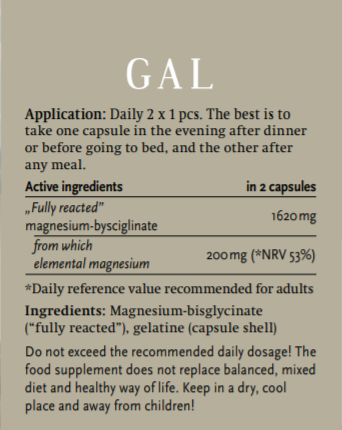
What is magnesium good for? Magnesium is a rather important mineral, the required quantity of which is difficult to absorb solely by nutrition. Stress, sports, food with high phytic acid content (seeds, wholegrain cereals, barns, etc.), as well as coffee and tea consumption, may speed up the clearance of magnesium from the body. As a result, magnesium deficit is a general phenomenon.
Magnesium foods:
- Pumpkin seed - kernels: Serving Size 1 oz, 168 mg
- Almonds, dry roasted: Serving Size 1 oz, 80 mg
- Spinach, boiled: Serving Size ½ cup, 78 mg
- Cashews, dry roasted: Serving Size 1 oz, 74 mg
- Pumpkin seeds in the shell: Serving Size 1 oz, 74 mg
- Peanuts, oil roasted: Serving Size ¼ cup, 63 mg
- Cereal, shredded wheat: Serving Size 2 large biscuits, 61 mg
- Soymilk, plain or vanilla: Serving Size 1 cup, 61 mg
- Black beans, cooked: Serving Size ½ cup, 60 mg
- Edamame, shelled, cooked: Serving Size ½ cup, 50 mg
- Dark chocolate -60-69% cocoa: Serving Size 1 oz, 50 mg
- Peanut butter, smooth: Serving Size 2 tablespoons, 49 mg
- Bread, whole wheat: Serving Size 2 slices, 46 mg
- Avocado, cubed: Serving Size 1 cup, 44 mg
- Potato, baked with skin: Serving Size 3.5 oz, 43 mg
- Rice, brown, cooked: Serving Size ½ cup, 42 mg..........
Magnesium supplements are important to everyone. Life Extension Foundation calls magnesium the “new vitamin D3”, because it is just as important, and its deficit is just as frequent, as that of D3. Absorption of magnesium preparations, however, is highly variable, and to most people, it causes diarrhoea, loose stools or other digestion problems, which - among others - may be the result of magnesium binding stomach acid, although low stomach acid production is a general problem. (Reflux is, in fact not a gastric hyperacidity, on the contrary, quite often it is caused by the low stomach acid levels. Stomach acid flows back to the Oesophagus because of the existing SIBO and/or non-functioning cardia, and it makes seem as if there is too much stomach acid, even when in fact there is too little.)
Inorganic forms of magnesium such as -sulfate, -oxide, -carbonate, -hydroxides are hardly utilised, but in turn, they may cause loose stools or diarrhoea, and they bind stomach acid. (Not absorbed magnesium causes, for example, diarrhoea, so it is not surprising that the consumption of inefficiently utilised magnesium types may cause diarrhoea and other intestinal problems.) The only inorganic magnesium type with a relatively good level of utilisation is chloride, which does not bind stomach acid, just the opposite, it helps its production.
Magnesium bisglycinate is the magnesium salt formed with glycine amino acids, and as such, it helps supply the body with not only magnesium but glycine as well. Numerous beneficial effects of glycine are presented in more detail in the description of glycine; let’s put some of them here, too. It boosts the efficiency of insulin, and significantly reduces the blood sugar level boosting impact of glucose - and so that of carbohydrates. Most of the beneficial effects of collagen are also due to its high glycine content: it reduces wrinkles, increases the elasticity of the skin, and rejuvenates and hydrates the skin. It helps detoxify the body and contributes to a more relaxed sleep.
Some may experience loose stools also from well-absorbed forms of magnesium (organic/chelate bound). For them, the solution is the best magnesium bisglycinate, as it is the gentlest version of magnesium, presumably because it is absorbed the best (and undoubtedly so in the case of those, to whom other forms cause diarrhoea).
In the case of this form, not “fully reacted” versions are quite frequent. E.g. products called magnesium glycinate (and not magnesium bisglycinate) for sure are.
GAL Magnesium bisglycinate for sleep Dosage: 2-4 capsules per day. The best is to take 1 or 2 before going to bed, as it might even help in case of heartburn during the night, or to have a better sleep.
Ingredients: 100 per cent magnesium bisglycinate (“fully reacted”), gelatin (capsule shell)
It contains 820mg of magnesium bisglycinate per capsule, from which 100mg is well-utilised elementary magnesium.
Most magnesium products contain deliberately misleading information! Most of the organic (chelate-bound) magnesium preparations available on the market aren’t in fact what their product labels say they are. In general, most people use activated magnesium compounds that are only party-reacted or not reacted at all. This means for example that the product label says that it contains magnesium malate, when in fact it only contains a mix of magnesium oxide or carbonate and malic acid. Or instead of magnesium citrate, the product contains only a mix of magnesium oxide and citric acid.
It is possible that the reaction has partly taken place, but most of the contained magnesium is not in the form indicated on the label! This is the reason, why even organic forms so often cause diarrhoea because they only partly contain the indicated form. Not “fully reacted”. These versions always contain more elementary magnesium, plus the ingredients are less expensive, so they are significantly more economical.
Many products are in the marketplace compounded from cheaper ingredients and mixes, usually with a higher magnesium content. It is imperative to ascertain that the selected product is fit for the purpose. Below is a list of percentages of elementary magnesium contents of “fully reacted” versions of the most common organic magnesium forms.
- Magnesium malate: 6 – 12% (the (mono-) magnesium malate is the real one,di-magnesium malate is not fully reacted!)
- Magnesium bisglycinate: 12 – 14%
- Magnesium citrate: 14 – 16%
- Magnesium ascorbate: 6 – 17%
- Magnesium-L lactate: 12 - 13%
The content of 1 pill/capsule must not exceed 1000mg, inclusive of the capsule shell and the excipients. This means that if we read on a product labelled as Mg malate that it contains 200mg magnesium per capsule/tablet, then we already know that it is not Mg malate, as the elementary magnesium content of Mg malate may not exceed 12 per cent (i.e. 1 capsule/tablet must not contain more than 120mg, but probably less).
Market research has found that the indication of magnesium content on many products can be misleading or false because the compound itself is indicated as magnesium, although elementary magnesium is only a small fragment of its makeup, as outlined by the percentages indicated above.
In our products, we, of course, use only the “fully reacted” version of everything, including magnesium.
A brief summary of the magnesium benefits:
Improvement of muscle work/sports performance, prevention of muscle cramps, boosting muscle regeneration, boosting the immune system, prevention of cardiovascular problems, activity against calcification (calcium deposits), supporting heart muscles, significant contra-stress effect, better sleeping, clearer thinking, more energetic days.
Who should select the biscyglinate form of magnesium? For those sensitive to magnesium, and those, who prefer taking capsules instead of powder dissolved in liquid.
To perfectionists, we recommend taking the biscyglinate form in the evening, 1 or 2 pieces before going to bed. During the daytime, depending on their targeted vitamin C intake, they should take the L-lactate or the ascorbate (Magne-C) form. The goal is to take in 250-400mg of elementary magnesium per day, or less may be sufficient if you consume venison/molluscs/cephalopods, pumpkin or quinate salts (do not count the magnesium content of chocolate/cocoa and seeds, because of their high phytic acid content and other components preventing absorption).
Made in the EU
Warnings
KEEP OUT OF REACH OF CHILDREN. DO NOT EXCEED RECOMMENDED DOSE.
If you are undergoing treatment for a medical condition or if you are pregnant or lactating, please consult your medical practitioner before introducing supplementary foods to your normal routine. The dietary supplement should not be used as a substitute for a varied and balanced diet or a healthy lifestyle. Store tightly closed in a cool and dry place.
References:
1. Examine.com
2. Clasado.com/research/

-Allergen-free
- Glutenfree
- Egg-free
- Soy allergen-free
- Dairy and lactose-free
- Free of sulfur dioxide
- Sugar-free
- GMO-free
- Vegetarian
- Vegan
- FSC paper material (CO31340)
- Packaging from carbon-neutral production
- 100% recyclable packaging
Green: The product has the described property
Red: The product does not have the described property

Brief and precise summary of Magnesium
Magnesium is an essential mineral substance that can be found in the body in large quantities. More than 600 enzymes’ functions depend on it. It has an important role in the metabolism of glucose, protein synthesis, and the proper functioning of muscles and the nervous system. While magnesium can be found in various foods, magnesium deficiency is still common. Surveys conducted in the USA show that nearly half of the population doesn’t reach the necessary daily intake, as processed food all but lacks magnesium.
The protective role of Magnesium in the development of depression
Depression is a serious mood disorder that unfortunately affects millions of people worldwide. It is not an occasional foul mood, but a condition that lasts months, or even years, and makes life tremendously difficult. There are several types of depression, which are usually treated with medication, unfortunately often without success.
Magnesium is a great sleep aid for the elderly
Sleep is one of the pillars of health, without which the body cannot function properly. Various sleep disorders, such as insomnia, affect a great many people, especially the elderly.
The effect of magnesium supplementation on bone health
When healthy bones are mentioned, most people will think of calcium, as its benefits have been highlighted for decades. While calcium is indeed important for bone health, calcium deficiency is relatively rare if one’s vitamin D levels are adequate. Another mineral substance, however, is much more often lacking magnesium, which not nearly enough people ingest, according to surveys.
Magnesium: An important mineral for blood sugar control
Unfortunately, the prevalence of metabolic syndrome, type 2 diabetes, and the insulin resistance associated with both is increasing rapidly around the world. The main reason for this is our modern lifestyle: apart from our circadian rhythm, the biggest change in recent decades has been in our diet. Not only has our caloric intake increased dramatically with the rise of industrialized foods, but at the same time, we are deprived of many important micronutrients.
Magnesium is as effective as drugs in treating migraine
Migraine is a nuisance to many, with no known cure. Symptoms are typically alleviated by anti-inflammatory medicines and painkillers. An increasing number of researchers are trying to find alternative treatment options. There’s more focus on vitamins and minerals, which are not only cost-effective solutions but safe for long-term use as well.






